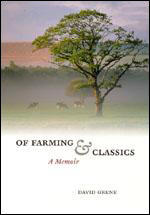Review: Grene, Of Farming and Classics

Last Saturday’s Chicago Tribune ran a great piece on David Grene’s recently published memoir Of Farming and Classics—a wonderfully original account of the author’s double life as a preeminent professor of classics at the University of Chicago and hard-working, old-fashioned farmer in rural Illinois and Ireland. Staff reporter Ron Grossman writes for the Tribune’s Books section:
David Grene could easily be described with the cliché “last of a breed,” but he was also the first of his kind. Or, at least, the first in a long time.
In 1937 he came to the University of Chicago to teach classics and, a few years later, bought a farm near Lemont. It wasn’t a hobby farm. Working the land himself, Grene disdained tractors in favor of horses, often coming to class with manure-caked boots. He later farmed in his native Ireland.
His personal style reincarnated that of the Roman aristocrats, with their love of the soil and taste for good books. Greek literature traces to Hesiod’s Works and Days, with its anticipation of The Old Farmer’s Almanac, a poetic tour of the agricultural year. Plantation owners in the antebellum South could often conjugate Latin verbs, but in the 20th Century, the study of ancient languages, once the centerpiece of a liberal education, precipitously declined. With Grene’s death in 2002, the scholar-farmer probably entered the history books forever.
Fortunately for Clio, the Muse of history, Grene’s memoirs have just been published. Of Farming & Classics delightfully recounts an era before corporate agriculture did in the family farm and pettifogging professionalism insulated the ivory tower from the larger world.
Read the rest of the article on the Tribune’s website.
We also featured several excerpts from Grene’s book previously on this blog:
Dublin Theatre in the 1920s and ’30s
Learning Greek and Latin in Dublin Schools
Honors Classics at Trinity College